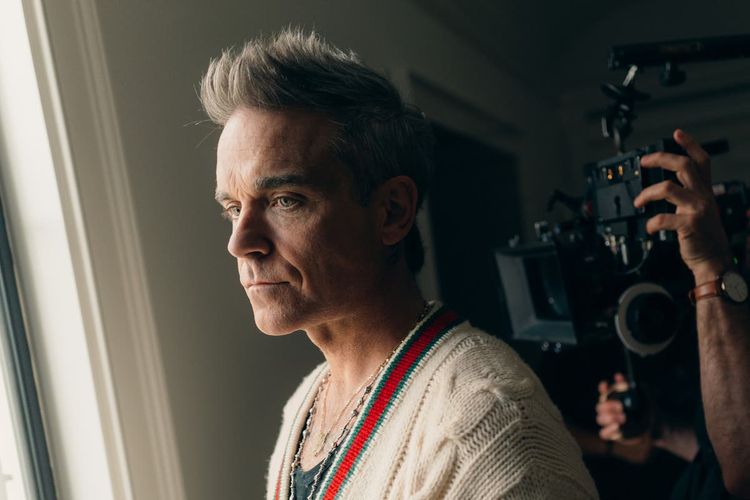Robbie Williams narrates an astounding life story from the comfort of bed – review

Get The Latest Arts News And Reviews With Our Free IndyArts Newsletter
Join Our IndyArts Newsletter For Free!
If we measure the true impact of a pop star not by their record sales or online streams but by how often their songs are passionately sung in karaoke bars or pubs after football matches, then there are few better examples than Robbie Williams. The charming singer from Stoke-on-Trent has left an enduring mark with hits such as “Angels”, “Millennium”, “Rock DJ” and “Feel”. However, Netflix’s latest four-part docuseries on him reveals a different tale altogether - one involving addiction, hopelessness, and ultimately, redemption.
This is the story of a teenager who joined a boy band named Take That and ended up performing regularly in front of 90,000 fans who were drunk or drugged. It's a typical story of becoming famous, indulging in excess, and eventually settling down in a peaceful life. Williams admits that he spends most of his time in bed when he's not on stage. Throughout the story, Williams talks about his experiences while lying beneath a cozy duvet. He feels guilty about his past decisions and refers to his current shows as silly, end-of-the-pier performances. Additionally, he talks about his desire to write serious songs like Radiohead's "Karma Police" but feels that he's only able to write pop songs like "Karma Chameleon."
Williams is a unique British icon. He tried to conquer America, but failed miserably, unlike other British greats such as The Beatles and The Rolling Stones. For him, his home in Los Angeles was a safe haven from the media. Williams clarifies that he did not aim to destroy America, but rather sought solace in the country. Williams is a blend of several personas - partly attractive, somewhat unclean, partially an artist, partly a singer who performs on cruises, partially intelligent, and partly a thuggish individual. This combination of qualities was not quite refined for Californian culture, which prides itself on perfect dentition and a consistent suntan.
Although he didn't become a famous figure across the Atlantic, Robbie Williams still feels like a globally recognized figure. This is the first unscripted project from RSA Films, owned by Ridley Scott. Asif Kapadia is the executive producer, known for his visually stunning films like Amy and Maradona. The documentary is directed by Joe Pearlman, who previously directed acclaimed documentaries like Bros: After the Screaming Stops and a recent portrait of Lewis Capaldi. In the realm of music documentaries, these filmmakers are more like Gary Barlow, a member known for his success in the band Take That, rather than Howard Donald. Music documentaries are becoming a profitable industry.
Although the Robbie Williams documentary may seem like a publicity stunt, as many similar shows do, it has enough depth to make it interesting. Unlike other shiny, manufactured pop stories such as those of Taylor Swift and Ed Sheeran, Williams' story is real and gritty. He even tells his daughter that she can watch it when she's older because it features footage of him at his worst, including when he was drunk, high, and receiving steroid injections. The film also shows Williams kissing Geri Halliwell and leading large crowds in explicit sing-alongs. Williams is a rough-around-the-edges type of guy, hailing from Stoke-on-Trent rather than Hollywood. However, the documentary offers catharsis as Williams is finally able to move on from his past and embark on another international tour.
Making fun of a man from the Potteries may seem easy, but Robbie Williams is a sensitive and authentic British superstar. Although his story is another addition to Netflix's flattering depictions of English celebrities, such as David Beckham and Tyson Fury, as well as George Michael and Keith Richards, his willingness to explore his own flaws and mistakes is a thought-provoking commentary on the challenges of fame in the early 2000s. Robbie Williams's documentary skillfully blends tragedy and comedy, capturing both the bravado and fragility of its subject.











































































